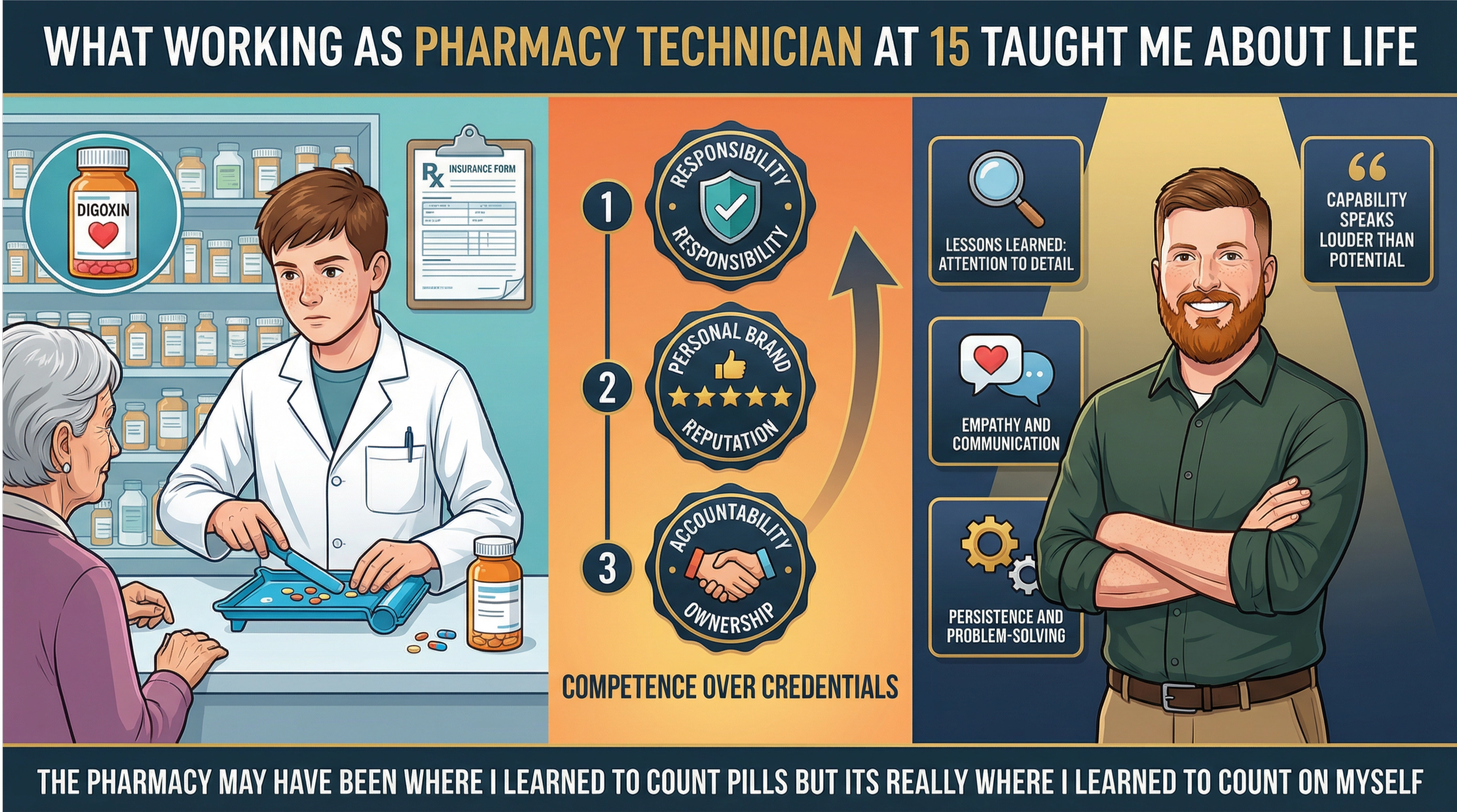What Working as a Pharmacy Technician at 15 Taught Me About Life
Most teenagers spend their after-school hours playing video games or hanging out with friends. I spent mine counting pills, managing prescriptions, and learning hard truths about responsibility that would shape who I am today. At 15, I was among the youngest pharmacy technicians, and the experience taught me lessons about accountability, personal brand, and responsibility that no classroom ever could.
The Weight of Real Responsibility
When you're handling medications that people depend on to live, there's no room for teenage carelessness. Every prescription I filled, every pill I counted, every label I printed carried real consequences. A mistake wasn't just a bad grade—it could mean someone didn't get their heart medication on time, or worse.
This wasn't the artificial responsibility of school projects or chores. This was the real deal. Patients trusted me with their health, their insurance information, and their most personal medical details. At an age when most of my peers were learning to be responsible for their homework, I was learning what it meant when other people's wellbeing depended on my accuracy and attention to detail.
The owner of the pharmacy didn't care that I was 15. The medications needed to be right, the insurance claims had to be processed correctly, and the patients deserved the same level of service whether I was having a good day or a terrible one. That taught me that true responsibility isn't about how you feel—it's about showing up and performing regardless of your circumstances.
Building a Personal Brand Before I Knew What One Was
I didn't realize it at the time, but working in a customer-facing role at such a young age was essentially a masterclass in personal branding. Every interaction I had with patients, every phone call with insurance companies, and every conversation with the pharmacist was building my reputation.
Patients would specifically ask for "the young one" when they called in refills, not because of my age, but because I had developed a reputation for being thorough and patient with their questions. I learned that your personal brand isn't what you say about yourself—it's what others consistently experience when they interact with you.
I saw how quickly word spread when someone was unreliable or dismissive. In a small community, your reputation follows you everywhere. This taught me that competence without character is worthless, and that how you make people feel is often more important than what you know.
I quickly learned that the real goal wasn't to be impressive for my age—it was to be genuinely valuable, period. That shift in mindset changed everything about how I approached not just work, but all my commitments.
Accountability in High-Stakes Situations
Nothing teaches accountability faster than making a mistake that affects someone else's health. Early in my time at the pharmacy, I mislabeled a prescription—caught by the pharmacist before it went out, but a stark reminder of what was at stake.
Instead of making excuses about being new or young, I had to own the error completely. I had to understand not just what went wrong, but why it went wrong, and what systems I needed to put in place to prevent it from happening again. The pharmacist didn't coddle me or lower the standards because of my age. The expectation was simple: figure out how to be better.
This experience taught me the difference between taking the blame and taking responsibility. Taking the blame is passive—it's about absorbing consequences. Taking responsibility is active—it's about understanding your role, learning from it, and making changes to prevent future problems.
I learned to speak up immediately when I made mistakes, to ask questions when I wasn't sure about something, and to double-check everything because "I thought I did it right" wasn't an acceptable explanation when someone's medication was involved. This accountability mindset became second nature and served me well in every job and relationship since.
Lessons That Last a Lifetime
Working as a pharmacy technician at 15 gave me a career foundation that extended far beyond healthcare. The precision required taught me attention to detail. The patient interactions taught me empathy and communication. The insurance battles taught me persistence and problem-solving.
But more than the technical skills, it taught me what it means to be someone others can count on. In a world where many people struggle with follow-through and reliability, having learned these lessons early became one of my greatest professional assets.
The experience also taught me the value of competence over credentials. While my peers were focused on getting good grades to get into good colleges to get good jobs, I was already proving my worth in the workplace. I learned that capability speaks louder than potential, and that earning trust through consistent performance opens doors that degrees alone cannot.
The Unexpected Gift of Early Professional Experience
Looking back, starting my career so young wasn't just about earning money or looking impressive on college applications. It was about learning who I could become under pressure, how I responded to real responsibility, and what kind of professional I wanted to be.
Those early lessons about responsibility, personal brand, and accountability became the foundation for everything that followed. They taught me that age is often just a number—what matters is your willingness to learn, your commitment to excellence, and your ability to put others' needs ahead of your own ego.
For any young person considering entering the workforce early, my advice is simple: find a role where the work matters, where mistakes have consequences, and where you'll be held to adult standards. The lessons you learn there will serve you for the rest of your life.
The pharmacy may have been where I learned to count pills, but it's really where I learned to count on myself.

